The copywriter’s step-by-step guide to niching down, presenting yourself as an expert, and winning higher-paying work.
Welcome to the world of copywriting, where words have the power to captivate, persuade, and sell. As a copywriter, you possess a unique skill set that can turn ordinary text into compelling content that drives results. But in a crowded market filled with copywriters vying for attention, how do you set yourself apart?
How do you gain that elusive "copywriter's edge" that makes clients take notice and choose you over others? The secret lies in finding your niche – that sweet spot where your skills, expertise, and passion converge to create a powerful personal brand.
This article is broken into three steps:
First, I’ll walk you through why determining your niche matters and how it can give you the competitive advantage you need to thrive in today's competitive copywriting landscape.
Next, you’ll download the accompanying worksheet by clicking here to follow the exact steps I outline in this article to define your own niche and upskill into an expert within it.
Or, download the worksheet in advance here.
Lastly, with your niche figured out and your upskill plan in place, go ahead and join WriterZen’s new Master ChatGPT in Content Marketing course that will teach you to leverage ChatGPT for customer research and building your personal brand to stand out as a content and copywriter.
But First, Who Am I?
I’m Justin and I’m a freelance copywriter that helps SaaS tools drive user acquisition and reduce churn with a unique blend of copywriting and customer-led growth strategies.
And since entering freelance copywriting, I’ve been fortunate enough to sell my first copywriting project for $5,240 USD, hit a steady 5K USD/month in the first 30 days, and get to 12K USD/month in my first year.
Yet, I don’t have a public portfolio, and my website is a simple one-pager.
Ultimately, my success (and yours) boils down to how well you market yourself, consistently network, and engage new leads as a niched expert.
Why Bother Niching Down?
Simply put, for these three main reasons:
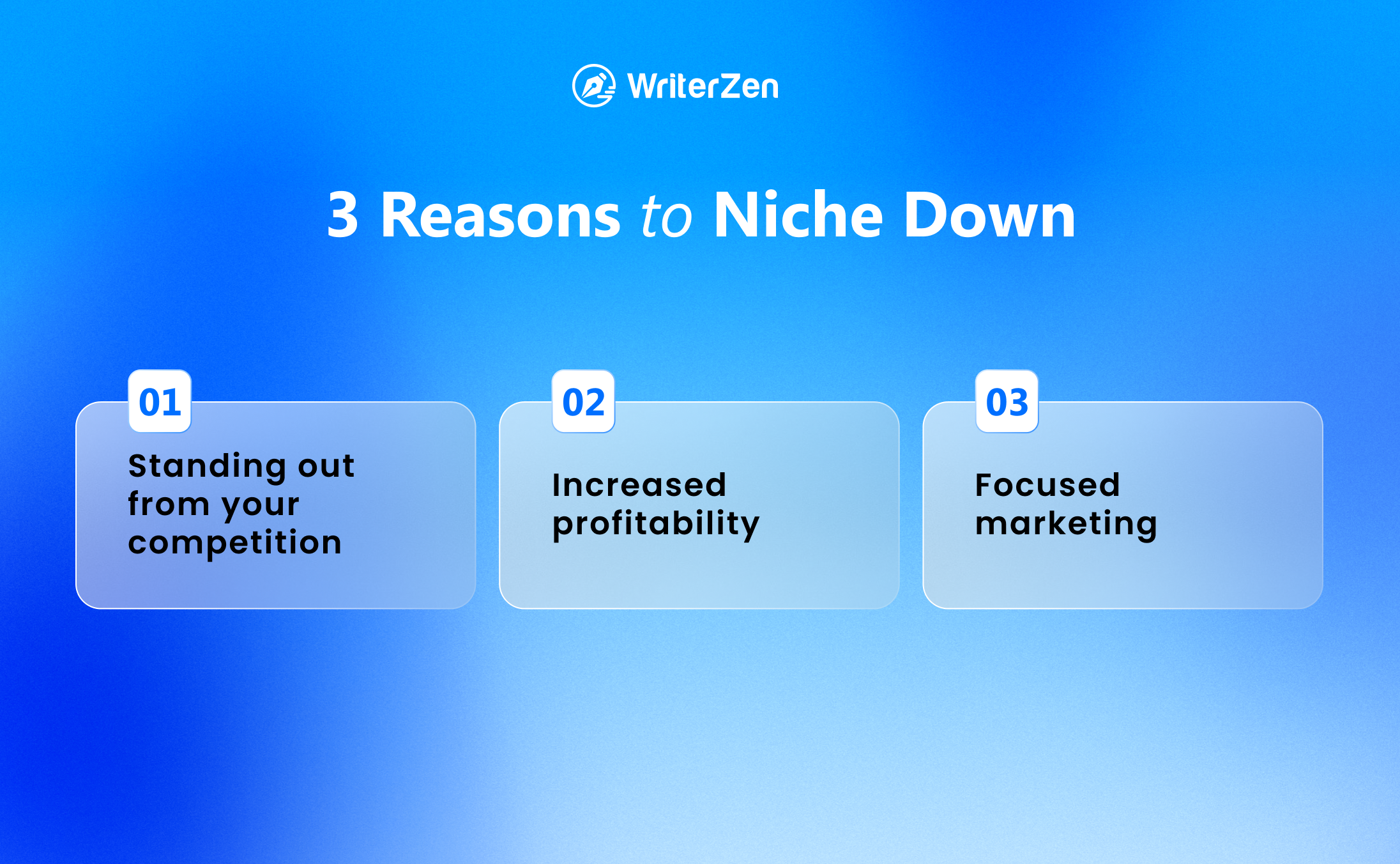
-
Standing out from your competition
With a specific niche, you can become known as an expert in that particular area; at the same time, harder to compete with.
-
Increased profitability
When you specialize, you can charge higher prices as the value provided is difficult for others to replicate. Profit increases, and high-value customers are willing to pay a premium for your specialized offerings.
-
Focused marketing
Niching means clear, targeted marketing campaigns that resonate with your ideal customers, resulting in higher engagement and conversion rates.
Warning: Don’t Niche Too Early
As a beginner copywriter, you shouldn’t jump straight into niching for these three reasons:
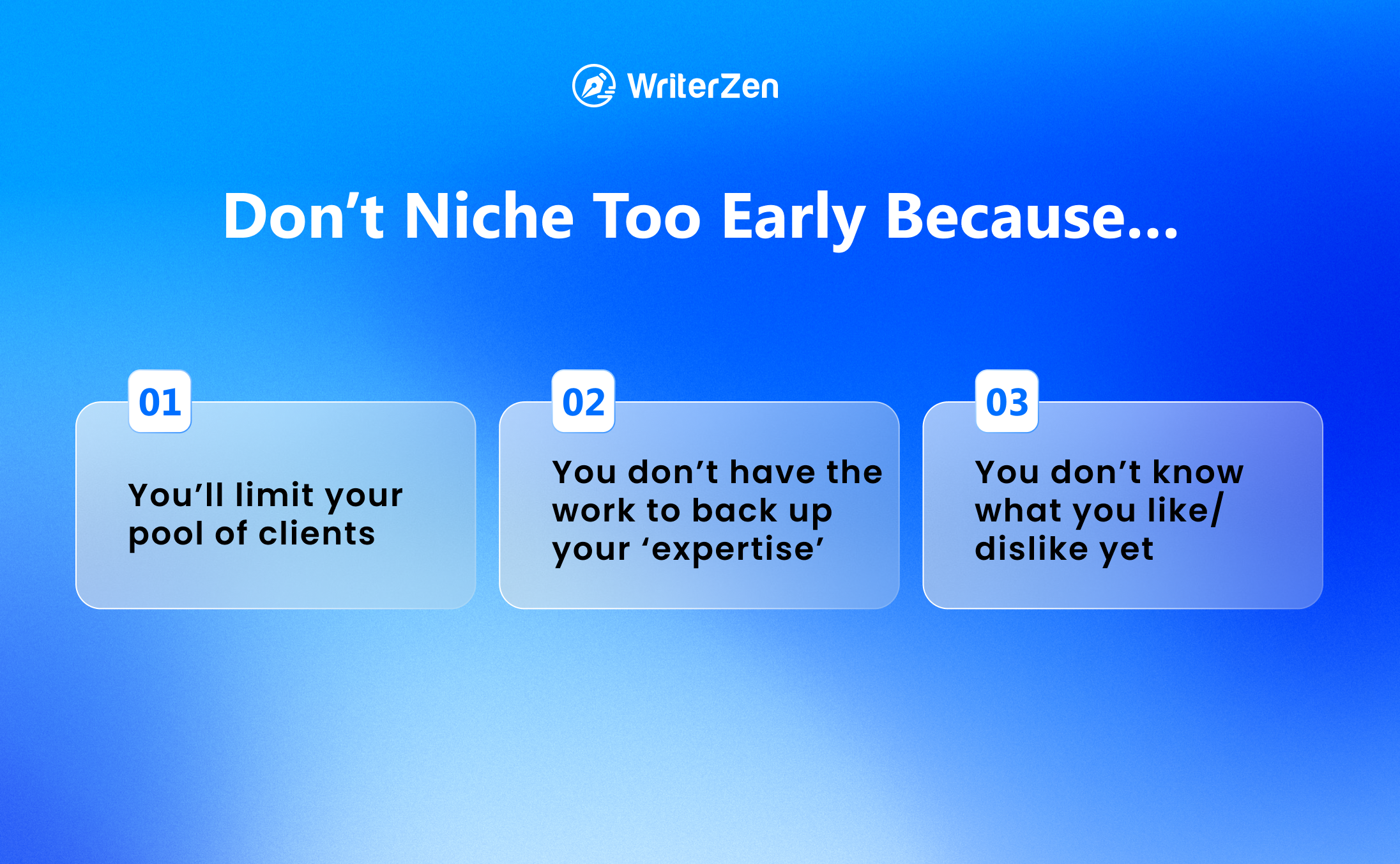
-
You’ll limit your pool of clients.
Practice doing paid jobs, build up your client base and referral opportunities, and practice problem-solving the inevitable dilemmas as you build your knowledge base.
-
You don’t have the work to back up your ‘expertise.’
In order to land high-paying jobs, you need case studies, results statements, and work examples.
-
You don’t know what you like/dislike yet.
If you focus on a niche or type of copy before you’ve had the chance to expose yourself to the industry or complete several jobs of that copy type, you just might find it’s not your cup of tea and inevitably have to re-niche again.
You can niche down later once you have three good project samples in a particular niche and are certain it’s an area you’d like to build your expertise.
Determining Your Niche
It’s detrimental at this point to slow your success by overanalyzing your niche. Success is progressive.
Determining your niche will largely be based on niches and industries you’re familiar with, the market’s needs and desires, and skills you have or can acquire.
Criteria 1: Familiar Niches
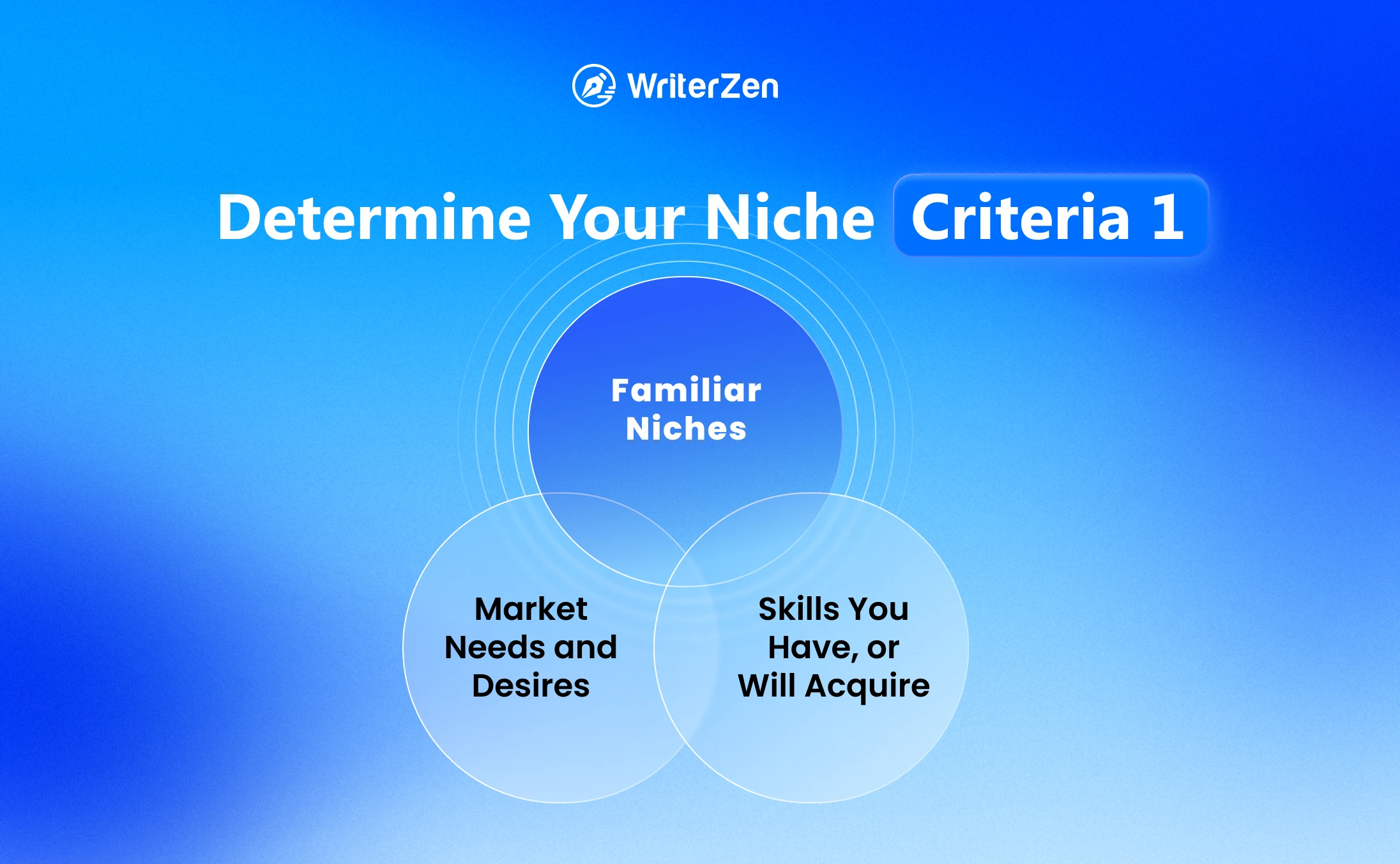
It’s tempting to dive right into financial, crypto, and pharmaceutical niches after reading about how skilled copywriters earn big bucks in them.
But the reality is that all niches are quite lucrative and profitable if you position yourself as an expert.
Think about what you’re legitimately interested in; it will make a huge difference when you have to deliver work.
In the accompanying worksheet, we’ll identify the niches you’re already familiar with and interested in.
Criteria 2: The Market’s Needs and Desires
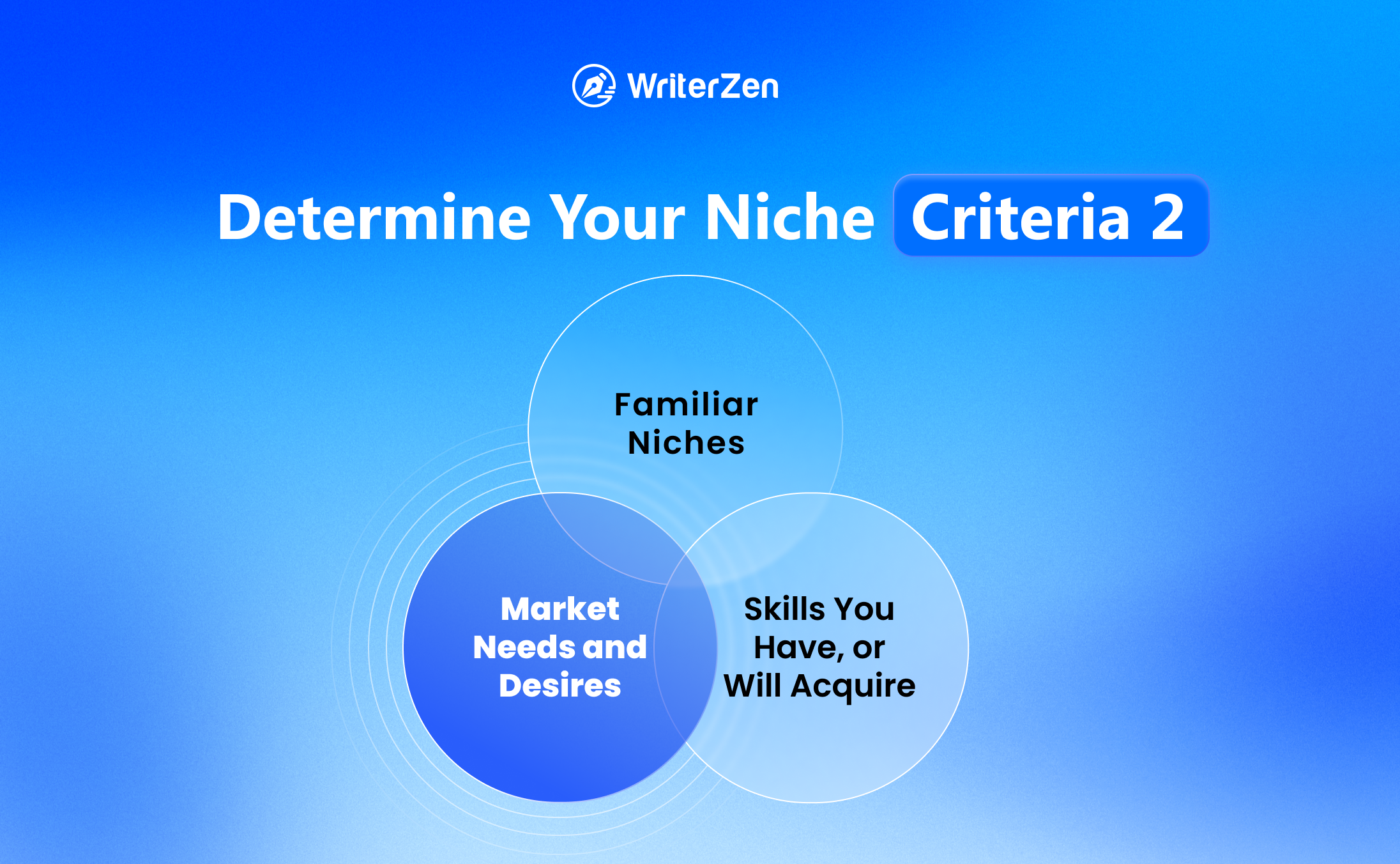
Don’t overthink this. If you want to become a billionaire, you’ll need to solve a problem that hasn’t been tackled a hundred times before; but if your goal is just getting to 5K/month, you don’t need to come up with something original.
But, you do need to solve real problems for clients.
If you want to work with pet-food companies, send LinkedIn messages to 10 pet-food company owners. Invite them to a 30-minute chat and ask them what they’re currently struggling with when it comes to marketing their business (pay them off for their time with some free copy advice, of course).
Not to sound sacrilegious, but this is a simple “ask, and you shall receive” scenario.
You can solve the same problem that’s already been solved in the market, just solve it better:
-
Be easier to work with and communicate better than your competition
-
Be that person who knows how to Google something before asking. Can’t find it? Then ask the client.
-
Be more professional, build a strong brand, and be willing to invest in your own learning and upskilling. Improvement never stops.
-
Review proposals with clients over the phone to address hesitations instead of emailing your proposal to them and ending with “Let me know if you have any questions.”
It’s unbelievable how poorly most freelancers conduct themselves, and thankfully for you, it’s incredibly easy to outperform 95% of other freelancers who are consistently dropping the ball.
Criteria 3: Skills You Have or Can Acquire
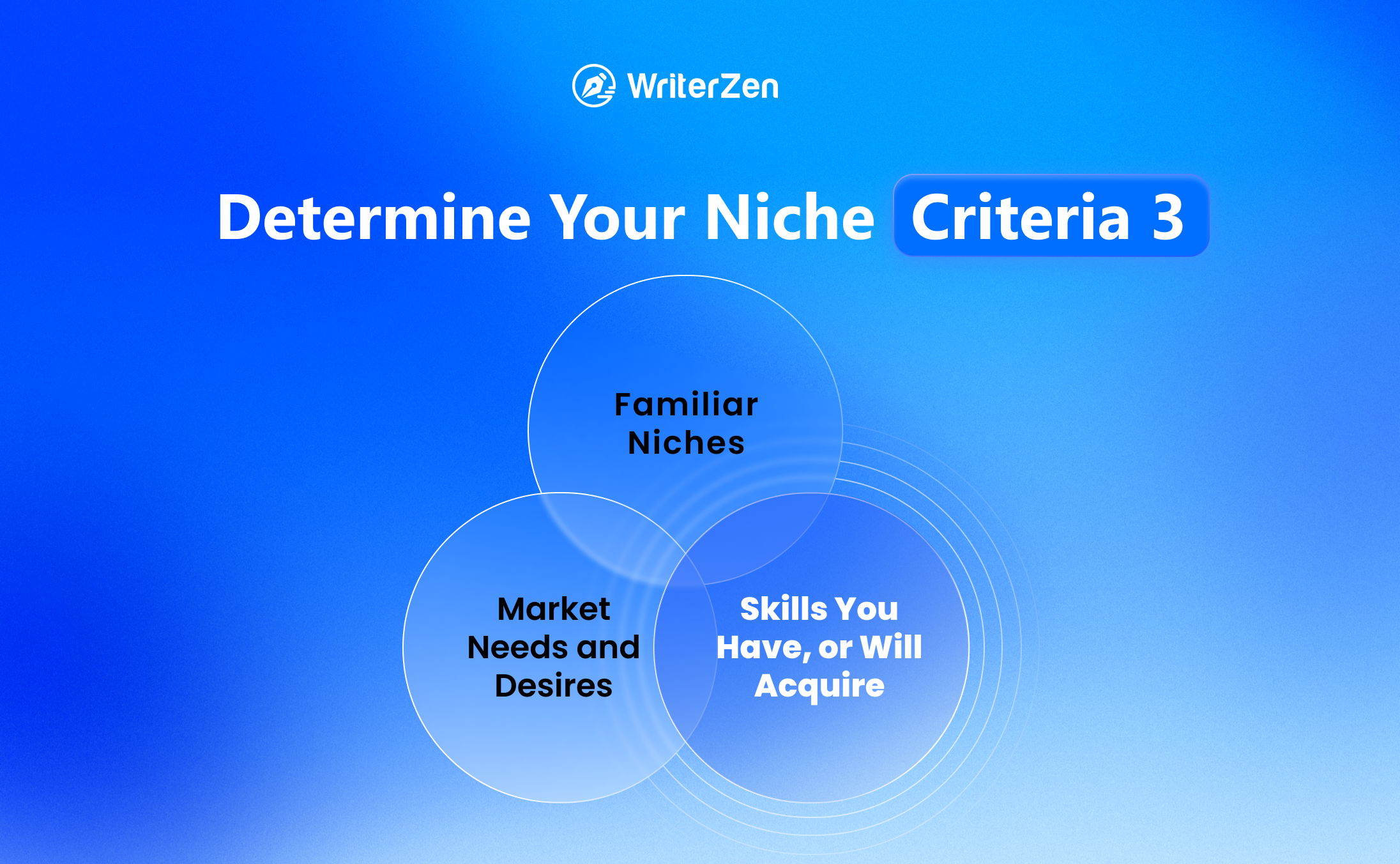
Take an honest look at yourself and what you’re good at. It doesn’t have to be related to copywriting. I have a really strong background in design and always leveraged that to help solve bigger problems for clients with my work.
Your Next Steps…
Now that you’ve got the theory down, let’s put that into practice and help you select and define your niche.
Step 1: Download the accompanying worksheet here. I’ll walk you through how to list out the skills you have with examples and show you how to make an upskilling plan to acquire the skills you’re lacking.
Step 2: Go ahead and join WriterZen’s new Master ChatGPT in Content Marketing course that will teach you to leverage ChatGPT for customer research and building your personal brand to stand out as a content and copywriter.















